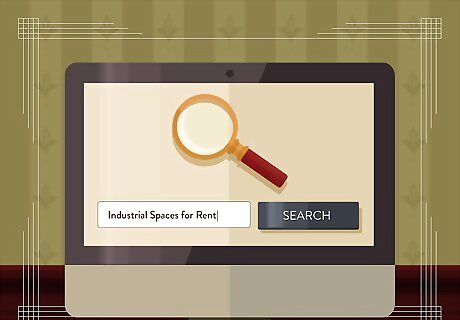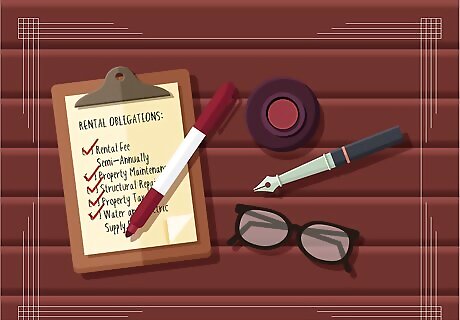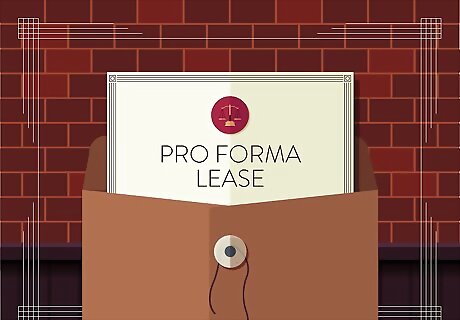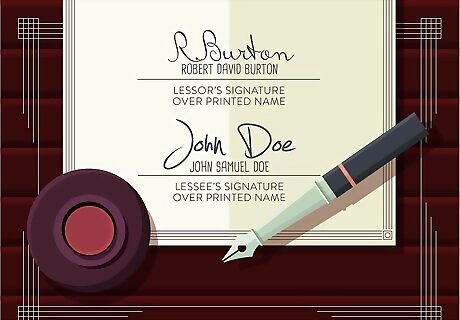
views
X
Research source
Leasing commercial space is more complex than leasing an apartment or house. A commercial lease doesn't have a standard lease form, and you'll need to sign a commercial lease agreement. You and the owner will work together to create a tailored lease that permits you to operate your business in the industrial space you're interested in. Learning how to find and lease an industrial work space can help you get your business up and running smoothly.
Finding Industrial Space

Choose a type of property. There are many different types of industrial space, and conducting your search for property will require you to determine what type of property best fits your needs. Industrial property is generally divided into three categories: warehouse property, manufacturing property, and flex (mixed use) property. Within those categories there are many different types industrial property, and knowing your business's needs will determine your property type. Warehouse - this type of facility is used for storage and/or distribution. Manufacturing facility - this property is used for creating, converting, or assembling materials Distribution facility - this is a specific type of warehouse that specializes in distributing goods, rather than creating or assembling them. Truck terminal - this is a specific type of distribution facility where goods are transferred from one truck to another. Manufacturing and storage do not take place at this type of facility. Flex facility - this property involves some type of mixed-use facility, which may allow for multiple businesses of varying natures or a single business that uses the property for multiple purposes. Service center/showroom - this type of flex facility is often associated with machinery and automobiles, and may be comprised of repair facilities, a showroom for various product models, or both.

Search online for property listings. Once you know what type of property your business needs, you'll need to search multiple listings to compare prices and floor plans. You can find listings on many real estate websites, or search online for industrial property in your area. Even similar space/floor plans will have different characteristics, so it's important to research and inquire about the needs for your business. Common qualities that are sought in industrial spaces include: energy-efficient fluorescent lighting well-maintained sprinkler systems, including early suppression, fast response (ESFR) systems roofs and flooring that can support heavy industrial equipment high ceiling clearance sufficient parking

View multiple properties in person. Even after extensive viewing online, you should always examine properties in person. Photographs may be misleading, and you'll want to visit the property to ensure that you can see your business making good use of the space. But don't stop at one property - some experts advise having at least two or three ideal properties within your price range. That way if one of the properties doesn't work out for any reason, you've got at least one backup that you know you'll be happy with.
Evaluating Lease Terms

Ask about hidden expenses. Some industrial property owners charge additional fees and expenses, such as maintenance fees and upkeep charges for shared facility space. In addition, you'll want to inquire about how utilities are measured and costs divided among tenants. Some property owners measure utility usage individually for each tenant. Others divide the cost of utilities each month by each tenant's rented square footage. Find out about utilities, fees, and other expenses before you agree to sign the lease. If the terms are unfavorable, you may be able to negotiate better terms or simply walk away without any obligations.

Know your rental obligations. Some industrial landlords cover the costs of repairs and maintenance, but many do not. Unlike residential property, where repairs are typically the responsibility of the property owner, commercial property varies considerably in terms of maintenance obligations. If you will be responsible for maintenance and repairs, your landlord will need to specify the details of this arrangement (verbally and in the lease, should you sign it), and must disclose how much those costs are expected to average.

Research your prospective landlord. Before you commit to a lease with someone, you should do some investigative research into that person's record as a property owner. Has he had numerous complaints from the Better Business Bureau or similar consumer protection groups? Has he had any legal problems or court cases brought on by former tenants? Is he currently restructuring a loan with no signs of financial stability? All of these factors are important to know, as they may be the difference between a property you can work from for years to come and a property you'll have to vacate in six months. Search online for your landlord's name, and cross check his name with consumer protection groups. You may also want to browse the archives of your local newspaper to see if any court cases have been brought against him by current or former tenants. Ask your prospective landlord if he's willing to submit to a credit check. Explain that you're interested in a secure, reliable facility, and that a credit check could help secure a long-term partnership.
Negotiating a Lease Agreement

Request a pro forma lease copy. Before you agree to sign a lease, ask to see a pro forma lease. This will lay out the standard terms of that property owner's rental agreement. It should clarify any lingering questions you might have about the particulars of that property.

Ask the landlord for concessions. Don't be afraid to try and bargain with the landlord. Most commercial property owners are hurting from the space being vacant, and in many ways it is a renter's market much of the time. The landlord may say no, but if you pitch these concessions as an incentive to rent for a long period of time, he may jump at the chance to secure a long-term tenant. Try negotiating the price of the lease, or see if the landlord is willing to work with you by offering money for repairs, subsidized renovation, or even a period of free rent. You should also negotiate some kind of limit on future rent increases. Tell the landlord that favorable terms will make you more likely to stay for a long-term occupation, which is ultimately mutually beneficial to both landlord and renter.

Ask about add-on clauses. Depending on the nature of your business and what you predict will happen in the future, you may want to ask your prospective landlord about certain add-on clauses. These can include terms that permit subletting, co-tenancy, and exclusivity of the property. Subleasing clauses would allow you to rent out some of your space to other businesses, in the event that you decide to scale back operations or dissolve your business before the lease is up for renewal. Co-tenancy clauses ensure that your business can continue, even if other tenants renting that property terminate their own businesses and/or vacate the property. They should also give you an option to terminate the lease if the landlord does not meet the co-tenancy clause terms. Exclusivity clauses ban the landlord from renting out space on your property to direct competitors who might threaten your business.

Hire an attorney. Before you actually sign the lease, have an attorney read the terms of the rental agreement closely. You should also review the lease yourself, but a lawyer will have a better understanding of real estate and business laws, and should be able to determine if the lease is fair and legal.

Sign the lease. If your attorney believes the lease is fair to you and meets all the necessary legal requirements of an industrial/commercial lease agreement, then it's safe to sign the lease. You can then begin moving your operations into the rental space and start growing your business.




















Comments
0 comment